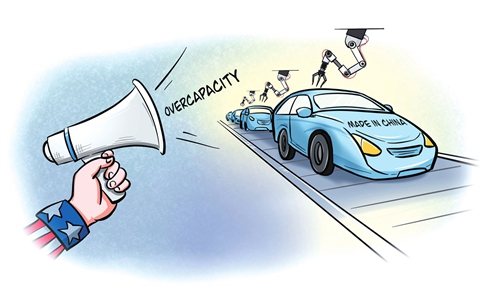
Illustration: Chen Xia/GT
Despite the challenges posed by anti-globalization sentiment, Chinese electric vehicle (EV) makers are persevering in their efforts to navigate toward the greatest common divisor on cooperation.The latest cooperation between Stellantis NV and Zhejiang Leapmotor Technologies is a typical example of such efforts.
Stellantis' chief operating officer for South America Emanuele Cappellano said the group plans to offer EVs co-developed with Zhejiang Leapmotor in South America, including top market Brazil, Bloomberg reported on Tuesday.
It is part of a wider partnership between the two groups, which announced last week the formation of their Leapmotor International joint venture, which will sell EVs in nine European countries including Germany, France, Italy, Spain and the Netherlands. It will also target South America, the Middle East and Africa, as well as the Asia-Pacific region, from the fourth quarter of 2024, according to a Reuters report.
At a time when protectionist policies targeting Chinese EV manufacturers are receiving increased attention, it is encouraging to see the world's fourth-largest automaker by sales actively pursuing collaboration with Chinese counterparts to enhance its presence in the EV market.
The partnership between Stellantis and Zhejiang Leapmotor in South America showcases the potential of a diversified business strategy. The joint venture cooperation model not only helps address trade barriers but also facilitates technology exchanges and exploration of third-party markets, creating a mutually beneficial situation for both parties.
The development is a vivid demonstration of Chinese EV makers' flexibility and innovation capabilities in terms of pursuing global cooperation. Over the years, Chinese vehicle exports have been on the rise.
However, faced with a complicated international environment, there is growing awareness among Chinese manufacturers that they need to step up investment to be more localized so as to gain better access to certain markets.
For instance, BYD will open its first European EV production factory in Hungary and will consider building a second assembly plant in Europe in 2025, according to media reports.
Zhejiang Leapmotor's partnership with Stellantis introduces a groundbreaking option, marking the first collaboration aimed at selling and manufacturing EVs from a Chinese manufacturer outside of China. This venture encompasses not only advances in products and technology, but also the exploration of various cooperative models, market strategies and brand development.
At its heart, this model strives to achieve mutual success.
From direct vehicle exports to local plant investments and collaboration with high-profile automakers, Chinese EV companies have been continuously exploring various avenues for global expansion. While protectionism may have put pressure on their development, it has also forced them to accelerate their pace of going global through various means.
The development of China's EV sector has not been derailed by Western anti-globalization sentiment, as industry players are still insisting on facing the challenges through market cooperation.
The reason why they have firm faith in cooperation is because of confidence in their technological innovation and superb quality in the midst of global competition.
This situation is also why many automobile executives and business associations believe that protectionism cannot help solve the challenges, and fair trade and cooperation offer the only path to achieve mutual benefits.
Relevant international cooperation must face up to localization needs, so Chinese EV makers need to customize and optimize products based on knowledge of local markets. Through such cooperation, Chinese EV companies can not only drive the development of the local market, but also promote the growth of local supply chains and related industries.
Through innovative and diversified business models, Chinese companies are fully capable of turning challenges into opportunities for sustainable development. This will not only be a victory for the global EV industry but also one for globalization. It will also prove that the international EV industry has never been a zero-sum game, but a global integrated one.



